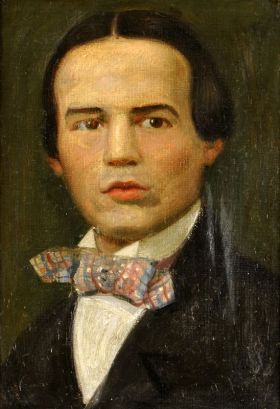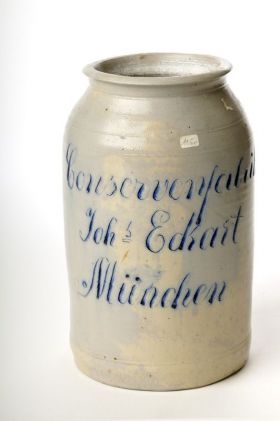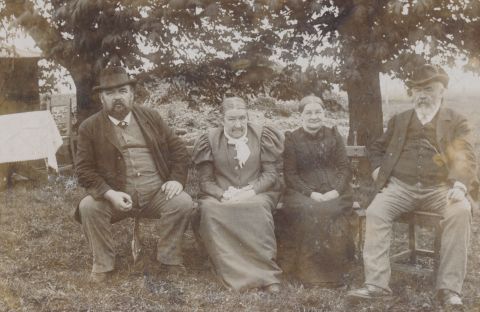Johannes Eckart (Da VII 10)
Johannes Theodor Georg Eckart, (*January 23, 1840, in Emskirchen, Germany, †November 26, 1899, in Munich, Germany), estate owner, canning factory owner; married Susanne Elisabeth Henriette Zick on May 2, 1868, in Emskirchen, Germany.
Childhood in Emskirchen
Johannes was born on January 23, 1840, in Emskirchen. He attended elementary school. He had to learn to stand on his own feet from an early age, as the family continually experienced financial difficulties. When he was 13 years old, his father David Eckart died; and three years later his mother had to sell the family’s home. After elementary school, Johannes Eckart attended trade school in Nuremberg. His sister Christina looked back on that time: "Johannes was a family man and very attached to his hometown. Thus, whenever there was no Sunday school, he embarked upon the seven-hour walk from Nuremberg to Emskirchen at the beginning of the weekend to spend the Sunday with his family. He spent the holidays catching fish and crayfish, gathering charcoal, berries and mushrooms. He sold what he caught and gathered. He was often involved in pranks. And when he came home with torn and wet clothing, mother, who is said to have had a ›loose hand‹, slapped his face."[1] For generations the family have recounted how Johannes once came home in the middle of the week, as he was suffering from scarlet fever – as usual, he walked, and in a heavy thunderstorm at that. He then infected his sister Christine and his brother Max with scarlet fever.[2]
Apprenticeship and Army Service in Nuremberg and Munich
After successfully completing trade school, Johannes undertook a commercial apprenticeship in Greiz, Thuringia, in 1857/58. He subsequently returned home and served in the Bavarian army between 1859 and 1865. However, the armed forces did not impose strict rules in times of peace, so Johannes was on leave for a total of 762 days during these years. This adds up to more than two years. At first, he was stationed in Nuremberg, then in Munich from 1863. Johannes had relatives in Munich; his uncle Philipp Wich ran a draper’s store at the address Residenzstrasse 5. Besides serving in the army, Johannes held a position as bookkeeper in Josef Beck’s factory that produced tar paper in Sendling, then a village near Munich (today a municipal district). Even after his army service, Johannes stayed in Munich and started to set up his own business as a sales agent. At first, he worked on the disinfection of privy pits, i.e., toilet pits, with his brother Friedrich. No one less than Professor Max von Pettenkofer, the famous promoter of hygiene measures, wrote a report about the activities of the Eckart brothers on September 15, 1867. This report states among other things: "The principle of their disinfection procedure is to acidify the contents of the toilet pits and to keep them acidic. This is mainly achieved by using solutions of iron and manganese metallic salts with an acidic reaction in combination with a bit of carbolic acid. … I have seen for myself in several houses that the aforementioned gentlemen carried out the procedure in a correct and thorough way and am thus able to highly recommend their disinfection company to everybody."[3] It was also during that time that Johannes conceived a procedure for protecting metals against rust and another for protecting walls against humidity and efflorescence. He also occupied himself with the usability of carbon black.
Marriage and Founding a Company
In 1864, Johannes,24 years old at the time, became acquainted with Susanne Zick (1844 to 1909), four years his junior, in the house of his uncle Philipp Wich. It was not long before they got engaged. However, marriage was only possible if Johannes was able to establish proof of an income or property. For this reason, he purchased land at the address Birkenau 24 1/3, where his brother lived at the time, in 1867. Johannes Eckart thus obtained citizenship in Munich and permission to marry. At the same time, he prepared to establish a business. When freedom of trade was introduced in Bavaria on January 30, 1868, this opened the way for the ambitious young man. On May 2, 1868, a Saturday, he founded the "Johannes Eckart Fruchtsaftfabrik" (Fruit Juice Factory). May 2, 1868, was one of the most important days of his life, also for another reason: He married Susanne Zick in the Protestant church in the street Sonnenstrasse. On the day of their marriage, the young couple moved into an apartment of the house at the address Salvatorplatz 2 in central Munich. The fruit juice production, which was still small, was set up in the apartment. At first, it only took up a single room. At that time, it was common practice to establish small production facilities in an abode.
Johs Eckart Fruchtsaftfabrik (Johannes Eckart Fruit Juice Factory)
The business started with the production of fruit juices, mainly from raspberries and blueberries. Johannes delivered the juices to the numerous refreshment stands at the busiest squares in Munich, among others. These stands served "soda water with and without juice". Many of these refreshment stands were owned by Friedrich Seyboth, a longtime friend of Johannes’ brother Friedrich Eckart. In 1869, the Eckart couple had their first son, who died that same year. Johannes and Susanne Eckart had twelve more children, only seven of whom survived early childhood: Fritz, Tilly, Käthe, Otto, Hedwig, Elsa and Johanna. This line of the family branch, that continued their successful activity in the food business, was later perpetuated by Fritz, born in 1870, and Otto, born in 1877. Johannes Eckart and his wife Susanne had just furnished the apartment at the square Salvatorplatz und established the fruit juice production when they already had to move out again. In 1869, the Eckart family rented a house at the square Gärtnerplatz 2; the factory was set up in the rear part of the house. That same year, Johannes Eckart officially registered his trade of producing fruit juices. He bought the raw ingredients for his juices – wild raspberries and blueberries – in the regions south of Munich, as far as the town of Holzkirchen, and later in the Bavarian Forest. As it was not possible to process all the berries, he also resold fresh berries. Johannes’ sisters Henriette and Jakobine supported him with his businesses. Soon, he was also engaged in methods for preserving fruit and vegetables.
Development of the Canning Factory
In the Franco-German War 1870/71, Johannes volunteered for military service and became orderly. The war was followed by the foundation of the German Empire on January 18, 1871. According to the memories of the family, Johannes proudly carried his nearly one-year old second son Fritz, born on February 22, 1870, around the square Gärtnerplatz; the child wore a black-white-red jacket.[4] In the aftermath of the war, Johannes Eckart again turned his attention to the topic of preservation. One problem of that time were the limited possibilities for cooling food. Even though there were underground ice houses, filled with big blocks of ice in the winter, the storage of food in these houses was cumbersome and very limited. This situation only changed when Carl von Linde invented the ice and cooling machine in Munich. The brewery Spaten established the first trial machine in 1871. This was a spectacular success. Refrigeration methods were also interesting for Johannes Eckart, but he thought that cans would be a more suitable way of preserving larger quantities of vegetables in particular. The production of cans had started in 1804, when the Frenchman François Nicolas Appert made his process of long-term preservation of food in airtight containers available to the public. In Germany, the first canning factories were founded from 1840. In North Germany, centers of canned food production had developed in Lübeck and Braunschweig. In South Germany, Johannes Eckart was one of the first to succeed with his experiments, learned to master the technique and added a department for canning vegetables to his fruit juice factory. In 1872, Johannes Eckart bought the neighboring house at Gärtnerplatz 1. This is where he lived with his family on the second floor, while the factory was in the rear building.
Das Gemüse für die Konservenabteilung bekam er zunächst von Münchner Gärtnereien. Dann aber erwarb Johannes Eckart Grundstücke in der Umgebung, um dort selbst Gemüse anzubauen und von den etwaigen Marktschwankungen unabhängig zu sein. Nachdem Johannes Eckart Erfahrungen auf dem Gebiet der Konservierung von Gemüse gesammelt hatte, befasste er sich verstärkt mit der Haltbarmachung von Fleisch. Er baute eine Geflügelzucht auf und erhielt sogar zwei Ehrendiplome des »Landwirtschaftlichen Vereins« für seine Verdienste auf diesem für ihn neuen Gebiet. Am 12. Dezember 1875 reichte Johannes Eckart beim bayerischen Innenministerium einen Patentantrag für ein Verfahren für »Fleischpökeln unter Druck« ein. Die Methode erwies sich als technisch und wissenschaftlich korrekt, aber sie war nicht wirtschaftlich. Daher experimentierte Johannes Eckart mit anderen Ideen der Haltbarmachung von Fleisch. So baute er Maschinen zum Pressen von rohem Fleisch. Eine andere Variante war die chemische Konservierung mit speziellem „Conservesalz“. Das auf der Grundlage der antiseptischen Borsäure hergestellte Salz verwendete er selbst in seinem Unternehmen; er verkaufte es aber auch in Säcken zu zehn Pfund.
Zwischenzeitlich waren die Eckarts mit dem Unternehmen vom Gärtnerplatz in die nahe gelegene Klenzestraße 27 umgezogen. Der Grund hierfür ist nicht überliefert, mag sein, dass die Räumlichkeiten am Gärtnerplatz 1 zu eng geworden waren. Das Geschäft florierte zu dieser Zeit. Mit dem Aufschwung gingen auch immer mehr dienstliche Reisen von Johannes Eckart einher. Er lernte ganz Europa kennen. Die Reisepässe aus seinem Nachlass weisen auf Reisen nach Großbritannien und Russland hin. Johannes Eckart sprach Englisch, Französisch, Dänisch, Schwedisch, Norwegisch und etwas Russisch. Auf einer Reise nach Norwegen wurde er mit dem Problem der Konservierung von Fisch konfrontiert. Zwar wurden damals schon Fische in Kühlwaggons mit Eisblöcken transportiert, doch konnte man nur kurze Entfernungen überbrücken. Mithilfe seines „Conservesalzes“ gelang es ihm, eine optimale Haltbarkeit bei Hummern und Fischen zu erreichen. Erstmals war es nun möglich, frischen Seefisch aus dem Norden nach München zu bringen. Wenn Johannes beruflich unterwegs war übernahm seine Gattin Susanne die Kontrolle der Geschäfte.
Neubeginn nach der Krise
Anfang der 1880er Jahre geriet das Unternehmen in Schwierigkeiten. Geschäftspartner waren zahlungsunfähig geworden, so dass auch Johannes Eckart Liquiditätsprobleme bekam. Zunächst verkaufte er sein Anwesen in der Klenzestraße 27 und verlegte Wohnung und Betrieb in die Rumfordstraße 27, später dann weiter in derselben Straße in das Haus Nr. 13. Die wirtschaftliche Genesung gelang nicht zuletzt durch den Verkauf des „Conservesalzes“ und durch die Intensivierung der Konservenproduktion. Johannes Eckart begann auch mit der Marmeladenherstellung und der Herstellung von Gewürzkräutern. Als die Geschäfte wieder besser liefen, wurden wieder größere Räumlichkeiten für die Produktion benötigt. 1887 kaufte Johannes Eckart daher die sogenannten „Daxenberger Häuser“, die zwischen der Dultstraße 5 und der Sendlinger Straße 7 und 8 lagen. Das Anwesen kostete 292.000 Mark. Als Wohnhaus diente der Familie das Gebäude Dultstraße 5. Das Verkaufs- und Lagerhaus befand sich in der Sendlinger Straße 7 und 8. Die Fabrikanlagen erstreckten sich zwischen Verkaufshaus und Wohnhaus. Zum Lieferprogramm gehörten damals Fruchtsäfte, Fruchtkonserven, Gemüsekonserven, Fleischkonserven und Konservierungssalz. Kunden waren unter anderem das Militär, das die Waren als Proviant verwendete, und Reisende, die zum Beispiel Konserven auf Schiffsreisen mitnahmen.
Landgut Grub
Am 29. Januar 1894 kaufte Johannes Eckart ein weiteres Grundstück: das Landgut Grub nahe Poing bei München. Es umfasste 250 Tagwerk, was in etwa 85 Hektar entspricht und kostete 86.000 Mark. Zum Gut gehörten eine Viehzucht, ein Gemüseanbau und eine Jagd. Neben Erbsen, die den Hauptanteil beim Feldanbau ausmachten, baute Johannes Eckart in Grub Himbeeren an. Er besaß zudem Obstbäume, mit denen er allerdings nicht so erfolgreich war. Johannes Eckart errichtete auch eine Geflügelfarm, die sogar mit einer Dampfbrutanstalt ausgestattet war. Johannes Eckarts älteste Tochter Mathilde, Tilly genannt, hatte auf einer Geflügelfarm bei Magdeburg die Grundlagen der Geflügelzucht gelernt. Von dort kamen auch die Brutmaschinen für Grub. Tilly leitete nach ihrer Ausbildung die dortige Geflügelfarm. Im April 1896 kam es auf dem Gut zu einer Katastrophe: Das Anwesen brannte zum großen Teil nieder. Johannes Eckart ging von Brandstiftung aus. Obgleich das Anwesen schnell wieder aufgebaut war und Grub eine Haltestelle der Bahn erhielt, wurde Johannes Eckart nicht glücklich mit dem Gut. Er verkaufte das unrentable Landgut daher 1899 wieder. Der Gutsnachbar Georg Keßler, einer der größten bayerischen Grundbesitzer, erwarb das Anwesen. Die Anbauflächen wurden allerdings noch pachtweise von Johannes Eckart genutzt.
Das letzte Jahr
Das Fabrikgebäude zwischen Dultstraße und Sendlinger Straße war recht großzügig entworfen, doch die Zunahme von Aufträgen und der gute Absatz führten dazu, dass die Produktionsanlagen wiederum erweitert werden mussten. Als dann die Stadt München die Dultstraße 5 für einen Straßendurchbruch niederreißen wollte, bedurfte es einer schnellen Entscheidung und Johannes leitete 1899 den Kauf eines Anwesens am Jakobsplatz 3 in die Wege. Es handelte sich um ein großes Grundstück mit Gebäuden, die gut zu einer Konserven- und Saftfabrik ausgebaut werden konnten. Kurz vor dem Kauf erkrankte Johannes Eckart schwer. Die Diagnose lautete Darmkrebs. Bei der Verbriefung des Kaufs war Johannes Eckart bereits bettlägerig. Dennoch trieb er den Ausbau des Anwesens am Jakobsplatz voran. Innerhalb kürzester Zeit ließ er eine Fabrik mit einer vergleichsweise schmalen Front zum Jakobsplatz und zwei weit nach hinten gehenden Innenhöfen errichten. Am 26. November 1899 starb Johannes Eckart mit nur 59 Jahren im Beisein seiner Familie.
Familie
Aus der Ehe mit Susanne Zick gingen 13 Kinder hervor.
- Ernst Eckart (Da VIII 16), (*15.02.1869 München, †11.03.1869 München).
- Friedrich Eckart (Da VIII 17), (*22.02.1870 München, †06.06.1928 München), Konservenfabrikant, königlich bayer. Kommerzienrat, Handelsrichter.
- Mathilde (Tilly) Eckart (Da VIII 18), (*15.01.1871 München, †17.10.1939 Hallthurm), Brutgeflügelzüchterin.
- Babette Eckart (Da VIII 19), (*30.12.1871 München, †17.01.1872 München).
- Hansl Eckart (Da VIII 20), (*28.12.1872 München, †18.01.1874 München).
- Anna Katharina (Kaethe) Eckart (Da VIII 21), (*31.12.1873 München, †01.04.1951 Berchtesgaden).
- Johanna Eckart (Da VIII 22), (*23.02.1876 München, †02.04.1877 München).
- Otto Friedrich Richard Eckart (Da VIII 23), (*08.03.1877 München, †13.12.1942 München), Konservenfabrikant, Diplom-Landwirt, königlich bayer. Kommerzienrat, Hauptmann, Familienforscher.
- Johanna Hedwig Eckart (Da VIII 24), (*25.02.1878 München, †24.10.1959 München), Schauspielerin, Inhaberin Auslandskorrespondenzbüro.
- Elsa Babette Eckart (Da VIII 25), (*03.04.1879 München, †16.06.1964 München).
- Maria Eckart (Da VIII 26), (*29.03.1880 München, †14.09.1880 München).
- Johanna Eckart (Da VIII 27), (*29.12.1881 München, †16.11.1947 Duisburg), Erzieherin, Krankenschwester.
- Richard Eckart (Da VIII 28), (*19.07.1883 München, †09.03.1884 München).
Einzelnachweise
- ↑ Eckart Family Archive, FA-S346, Chronicle of the Eckart Family, part 3, memories by Johannes Eckart’s son Otto Eckart, page 3. Christina Eckart, née Schmidt.
- ↑ Ibidem
- ↑ Eckart Family Archive, FA-S1314, Pettenkofer report, September 1867.
- ↑ Eckart Family Archive, FA-S346, Chronicle of the Eckart Family, part 3, memories by Johannes Eckart’s son Otto Eckart, page 5.






